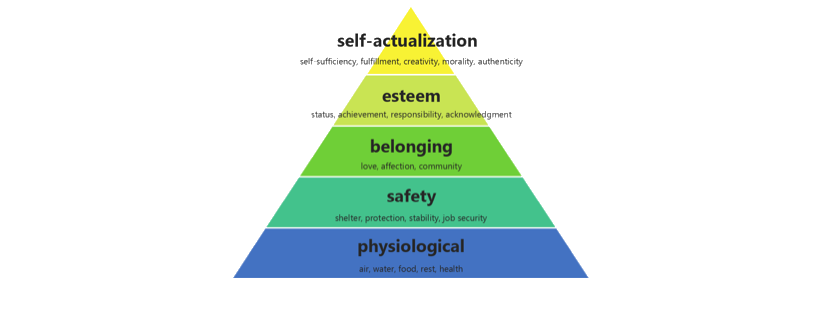I suffer from “hanger.” When I get hungry, I get angry. So I before I can be my best self — thinking critically or being creative — I need to have eaten. Believe it or not, businesses are the same way.
Human needs
In 1943, psychologist Abraham Maslow proposed a hierarchy of needs. He argued that humans need to satisfy their physiological needs — air, water, food, rest, and health — before they can consider anything else.
Then, once a person’s physiology is satisfied, they can address safety needs, then belonging, and then esteem. Finally, after all other needs have been met, a person can address self-actualization — self-sufficiency, fulfillment, creativity, morality, and authenticity.
This helps explain why it’s so hard to achieve our big personal and professional dreams… There’s a lot of other stuff to deal with first!
Human happiness
In Delivering Happiness, CEO of Zappos Tony Hsieh argues that human happiness also fits into a hierarchy.
He says that humans are happiest when they have pleasure, passion, and purpose. A pleasure (eating, for instance) can turn into a passion (cooking), which can turn into a purpose (teaching others how to cook and how to connect over food).
But if you get stuck on pleasure, you spend your life chasing the next high. If you’re able to find a passion, you’ll feel engaged and “in the flow.” Finally, if you find a purpose, you’ll life will take on greater meaning beyond yourself. Hsieh argues that long-lasting happiness comes from a sense of purpose.
Business success
Ultimately, Hsieh argues that businesses are a lot like people. To be successful, businesses need base achievements first: profits. But if a company just chases profits, their achievements will be short-lived and unfulfilling.
So he encourages businesses to find their passion and purpose as well. For instance, Zappos’ passion is creating “WOW moments” for customers, and their higher purpose is “delivering happiness.”
So what?
What’s so great about these hierarchies? Why should we care?
Because now we can identify when we’re focusing on base desires, like pleasures and profit. With some effort, we can steer ourselves, our teams, and our businesses towards greater passion and purpose.
In the end, this could make us all happier. And who doesn’t want to be happier?
———————
Action items:
〉 Draw two pyramids like the “human happiness” and “business success” pyramids above.
〉 On the pyramid, write one word or sentence to describe each level. For instance,
“My pleasure comes from…”
“My passion is…”
“My purpose is…”
“My business’s profits come from…”
“My business’s passion is…”
“My business’s purpose is…”
〉 Think about how you can steer yourself and/or your
business towards greater passion and purpose.
〉 Go make it happen.

